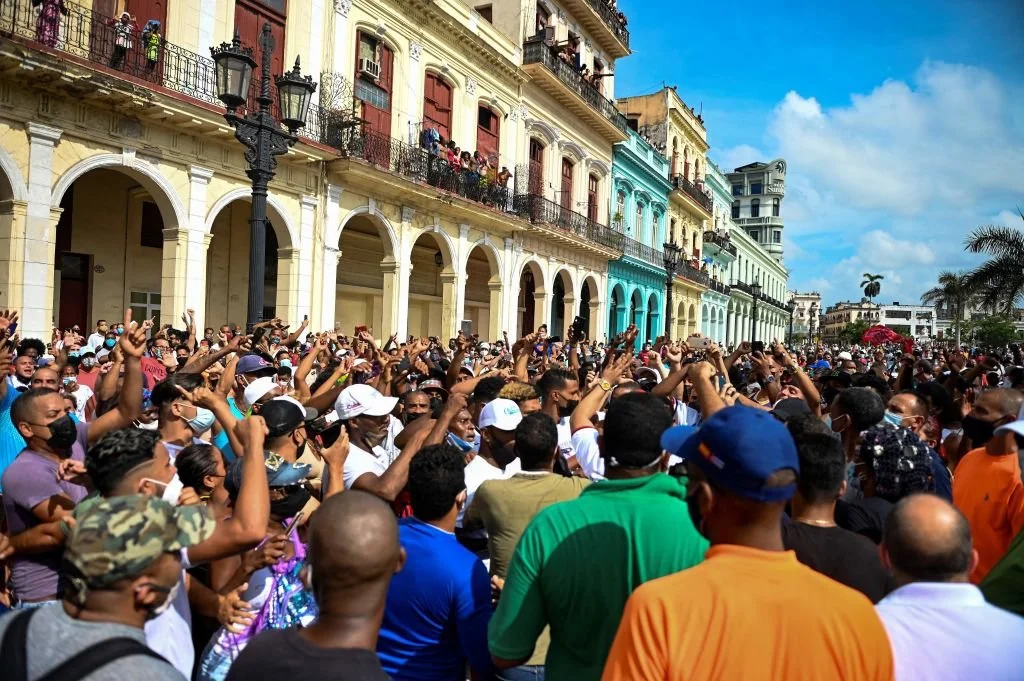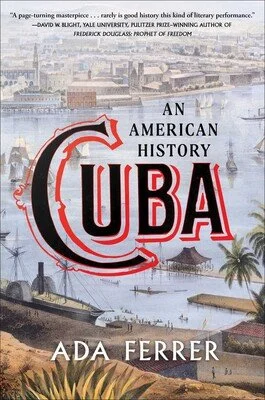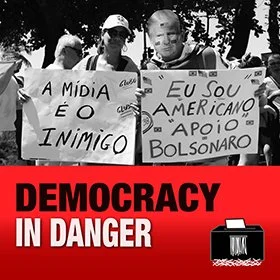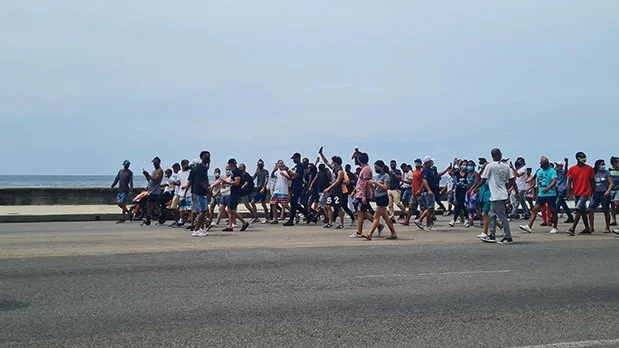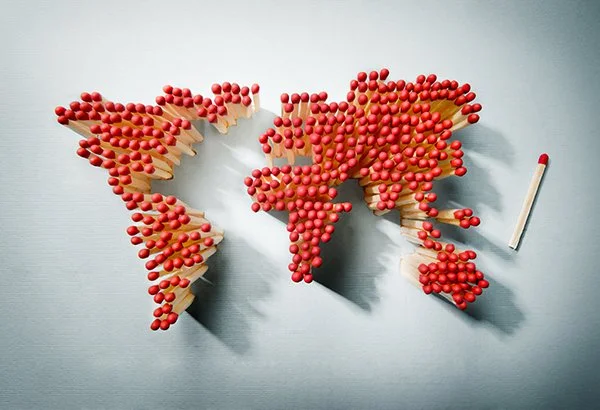Hot Spots, Part II - Cuba
Amid crushing U.S. sanctions, one-party rule and now the pandemic, Cubans are speaking up. Will it stick?
Read
An extraordinary wave of protest came to Cuba over the summer. Thousands hit the streets to call for more civil liberties, cheaper food and better health care, in a nation whose leaders for six decades have defended socialism, at least in words. This week, New York University scholar Ada Ferrer joins us along with guest-host David Nemer, a media expert, to bring some historical perspective to the circumstances in her native country. And our producer considers the island’s uncertain prospects for homegrown activism unafraid of repression and political transformation free of American interference.
For Ferrer, there is no understanding Cuba in the present without considering the United States’ involvement in the island’s affairs since the 1700s, and vice-versa. Cubans, she recalls, helped fund America’s revolution against Great Britain. But when U.S. merchants began seeing Cuba as a source of profit, and fertile ground for the expansion of American slavery, the sentiment of liberty was not reciprocated. Today, more than a century after a four-year U.S. occupation of Cuba came to an end, the country’s one-party state is trying to pin blame for the recent unrest on nefarious American designs.
If anything, however, the core ideals of Cuba’s current pro-democracy movement are rooted in the bygone independence struggle. Democracy in Danger producer Robert Armengol reflects on the current crisis in the land where his parents and grandparents were born and the site of his social-science research. And he says things do sound different this time around. More and more Cubans are not afraid to speak out — online and in the public square.
Meet
Ada Ferrer is the Julius Silver Professor of History and Latin American and Caribbean Studies at New York University. She has taught at NYU since 1995 and written numerous books about the history of race, slavery and revolution in Cuba as well as Haiti. Ferrer’s latest work, Cuba: An American History (Simon & Schuster, 2021), offers readers a sweeping, lyrical take on the island’s past, from Columbus to the present. And, along the way, she tells an indispensible shadow-history of the United States. Follow Ferrer on Twitter @Adita_Ferrer.
David Nemer is an associate professor of media studies at the University of Virginia, and a faculty associate at Harvard University’s Berkman Klein Center as well as Princeton University’s Brazil Lab. His new book — out this week — is Tecnologia do Oprimido: desigualdade e o mundano digital nas favelas do Brasil (Editora Milfontes, 2021). It looks at the uses of information technology among the marginalized in his native country. Nemer has also done fieldwork on the burgeoning role of social media in Cuba. Follow him on Twitter @DavidNemer.
In many ways the story of modern Cuba is the story of family separations. Only 10 months after she was born, Ferrer left the country in her mother’s care. Their departure came just ahead of the Cuban Missile Crisis and the subsequent shutdown in travel between the United States and Cuba. Her elder brother remained behind.
Cuba: An American History offers a fresh perspective on key events over the last five centuries, including the 1959 revolution that brought Fidel Castro to power. Ferrer argues — against the conventional wisdom — that Cold War tensions between Western powers and the Communist Bloc provide an insufficient explanation for the revolution’s turn, in the early 1960s, toward state socialism.
Her first book, Insurgent Cuba: Race, Nation, and Revolution, 1868-1898, recounts the Cuban struggle for independence from Spain — and the central role that slavery played in that conflict.
In Freedom’s Mirror: Cuba and Haiti in the Age of Revolution, Ferrer explores how slaveholding planters in Cuba reacted to the Haitian Revolution in the late 18th century. It wasn’t pretty.
Not long after the protests this summer, Ferrer took issue with U.S. sanctions against Cuba and, in particular, new Trump-era restrictions on sending money to family members on the island. This kind of “political football,” she said, only hurts the Cuban people and never did anything to weaken the Castro regime’s grip on power. Read her op-ed in The Hill.
Nemer’s Tecnologia do Oprimido explores how digital tools are helping residents in Brazil’s favelas, or slums, navigate an oppressive social terrain — and, sometimes, even to prosper in it. An edition in English is due out in February from MIT Press.
Writing for Salon last year, he compared Brazilian President Jair Bolsonaro, who disastrously mishandled the covid pandemic, with American cult leader Jim Jones. Nemer has also called Bolsonaro a “hostage” to the radical, antidemocratic groups that support his presidency.
Learn
The peaceful demonstrations in July across Cuba were the biggest civic movement against the government in decades. If your Spanish is up to the task, don’t miss this New York Times essay about that day from the renowned Cuban blogger Yoani Sánchez, editor of the online newspaper 14ymedio.
While Sánchez insists that young Cubans’ voices “will not be silenced,” plans to renew their campaign for freedom last month fell apart amid threats from the authorities and more arrests.
Yunior García, a key leader of the dissident Archipiélago organization, fled secretly to Spain on the eve of the marches scheduled for Nov. 15. In Miami, Cuban Americans protested in solidarity when the effort on the island failed.
As Human Rights Watch explains, the government of Cuban President Miguel Díaz-Canel moved to severely restrain online speech under Law-Decree 35, issued in August. To make matters worse, American internet platforms frequently block Cuban users for fear of running afoul of the decades-old U.S. embargo — known in Cuba as “the blockade.”
To the surprise of many, Cuba’s military got involved in quelling the July 11 uprising. Laura Tedesco and Rut Diamint have that story for Foreign Affairs.
All that action on the streets last summer didn’t come out of nowhere. Read about performance artist Otero Alcantara, a leader in the San Isidro movement, who staged a hunger strike in May to protest government censorship.
And while the state decries civil rights activists, officially, as “counterrevolutionaries,” it’s not uncommon for Cuban authorities to quietly address some demands without acknowledging the broader context. Just days after the rallies in July, the regime announced it would ease some rules on importing food and medicine.
Never mind the history of foreign interventions that have served only to disfigure the Cuban political landscape. Hardliner exiles like historian Jaime Suchlicki want military hardware and training for the opposition movement. But many commentators say the exact opposite — lifting U.S. sanctions — is what President Biden should do to support democracy in Cuba.
This much is certain: taking Cuba policy in a more aggressive direction would play into the hands of the Community Party narrative.
In any case, the White House is considering another approach. Reuters reported last month that the Biden administration is working on proposals to roll back Trump’s restrictions on family remittances. But it’s a political minefield; conservative-leaning Cuban Americans remain a critical constituency in the swing state of Florida.
On this show’s wrap-up, you’ll hear Robert talk about a student-turned-independent-journalist who was detained and questioned in the central city of Camagüey for 10 days after trying to cover the July protests. For now, she says she’s staying put in her country and has posted boldly about her views and her ordeal on Facebook.
But for many others, the island’s economic woes often prove too much to bear, and they continue taking dangerous trips in the hope of starting over in America. Even if they make it across the sea there are legal risks. New policies have been chipping away at the favorable immigration status that Cubans historically have enjoyed in the United States.
Heard on the Show
We capped off this episode to the tune of the 2021 Latin Grammys Best Urban Song and Song of the Year: “Patria y Vida.” Recorded by musicians associated with the San Isidro movement, this reggaeton single has become the anthem of opposition in Cuba. Earlier this year, NPR’s Alt.Latino podcast unpacked the lyrics line by line and explored how the song came into being.
About This Series
We’re rounding out Season Three with a tour of democracy hot spots both abroad and close to home. We began last week with an examination of the effort in our own hometown to hold far-right extremists to account for the violence inflicted during the “summer of hate.” Coming soon: Myanmar and Eastern Europe.


